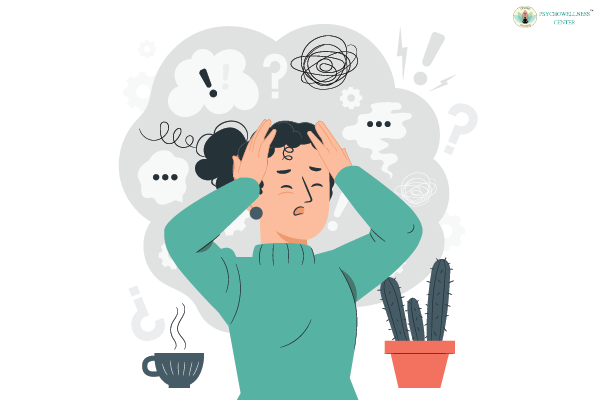Anxiety is like an uninvited guest that overstays its welcome, lingering in the corners of our minds, causing unrest and unease. While occasional worries are a part of life, for some, anxiety becomes an unwieldy force that disrupts daily living. Among the many faces of anxiety, one that often remains misunderstood is Generalized Anxiety Disorder (GAD). Imagine having a mind that never rests, a constant swirl of “what ifs” and “maybes” that overshadow even the simplest of tasks. This is the reality for individuals battling Generalized Anxiety Disorder. Unlike specific phobias, GAD casts a wide net of worry, encompassing various aspects of life from health and finances to relationships and work. It’s like being trapped in a cycle of fear and apprehension, unable to break free from the grip of anxiety.
The origins of GAD are multifaceted, stemming from a combination of genetic predisposition, brain chemistry, and life experiences. For some, a family history of anxiety disorders sets the stage for their struggles, while others may find themselves entangled in the throes of anxiety due to traumatic events or chronic stressors. The brain’s intricate network of neurotransmitters also plays a significant role, with imbalances in serotonin, dopamine, and norepinephrine contributing to the development and maintenance of anxiety disorders. It’s like a symphony gone awry, where each note plays out of tune, creating discord within the mind.
Symptoms of GAD
Persistent Worry: The hallmark of GAD is excessive and uncontrollable worry about various aspects of life, such as work, health, relationships, and finances. These worries may persist even when there’s little or no reason to be concerned.
Physical Symptoms: Anxiety isn’t just a state of mind; it manifests in the body as well. People with GAD may experience symptoms like muscle tension, headaches, fatigue, trembling, sweating, and gastrointestinal discomfort.
Difficulty Concentrating: The constant barrage of worries can make it challenging to focus on tasks or make decisions. Individuals with GAD may find themselves easily distracted and struggle to complete everyday activities due to their racing thoughts.
Restlessness and Irritability: The undercurrent of anxiety can leave individuals feeling on edge and irritable, making it difficult to relax or enjoy leisure activities. They may also experience difficulty falling or staying asleep, leading to fatigue and irritability during the day.
Avoidance Behaviors: In an attempt to alleviate their anxiety, individuals with GAD may avoid situations or activities that trigger their worries. However, this avoidance only serves to reinforce their anxiety in the long run, perpetuating the cycle of fear and avoidance.
Treatment
Living with GAD can feel like navigating a labyrinth of anxiety, but there are paths to relief and healing. Here are some resources and approaches that can help individuals manage their symptoms and reclaim their lives:
- Therapy: Online counseling for Generalized Anxiety Disorder (GAD) and therapy has become increasingly accessible options for individuals seeking support for GAD. Qualified psychologists and therapists offer virtual sessions that provide a safe and confidential space to explore and address anxiety-related issues.
- Cognitive Behavioral Therapy (CBT): CBT is one of the most effective forms of therapy for GAD. It helps individuals identify and challenge their irrational beliefs and negative thought patterns, replacing them with healthier ways of thinking and coping.
- Medication: In some cases, medications such as SSRIs or SNRIs may be prescribed to help alleviate symptoms of GAD. These medications work by increasing the levels of neurotransmitters in the brain that regulate mood and anxiety.
- Self-Help Resources: There are numerous self-help resources available for individuals with GAD, including books, websites, and apps that offer tools and techniques for managing anxiety. These resources may include relaxation exercises, mindfulness practices, and stress-reduction techniques.
- Support Groups: Connecting with others who understand what it’s like to live with GAD can provide validation, encouragement, and practical coping strategies. Online support groups and forums offer a platform for individuals to share their experiences, seek advice, and offer support to others facing similar challenges.
In a world where mental health stigma still lingers like a shadow, reaching out for help can feel like an uphill battle. It’s important to remember that you can get help from the professionals. Whether through counseling, therapy, or online sessions, support is within reach.
Professional psychologists and counsellors serve as guides through the labyrinth of anxiety, offering coping strategies, relaxation techniques like deep breathing and Meditation, and a safe space to explore and understand your thoughts and emotions. Through Cognitive-behavioral therapy (CBT), individuals learn to identify and challenge negative thought patterns, gradually reclaiming control over their lives. Recovery from GAD is not a linear path but rather a series of peaks and valleys, each offering lessons to be learned and growth to be experienced.
In addition to therapy, lifestyle modifications such as regular exercise, adequate sleep, and Mindfulness practices can significantly impact anxiety levels. Building a support network of friends, family, and peers who understand and empathize with your struggles can also provide invaluable encouragement along the way.
Generalized Anxiety Disorder may cloak itself in uncertainty and fear, but it does not define who you are. By shedding light on the shadows of anxiety, we can begin to unravel its knots and reclaim our sense of peace and well-being. Through counselling, online sessions, and guidance from the Best psychologists in Delhi, individuals can embark on a journey of self-discovery and healing. Together, we can rewrite the narrative of anxiety, transforming it from a formidable foe into a catalyst for growth and Resilience.
Psychowellness Center offers mental health counseling at multiple locations in Delhi NCR, including NOIDA, Faridabad, Janakpuri, Dwarka, and Vasant Vihar. Having these options can make it easier to get support from the best psychologists near me, whenever you need it.
At the Psychowellness Center, Dr. R K Suri, Clinical Psychologist and life coach at TalktoAngel, collaborates with Mr. Utkarsh Yadav Counselling Psychologist, to provide top-notch mental health support and guidance.

